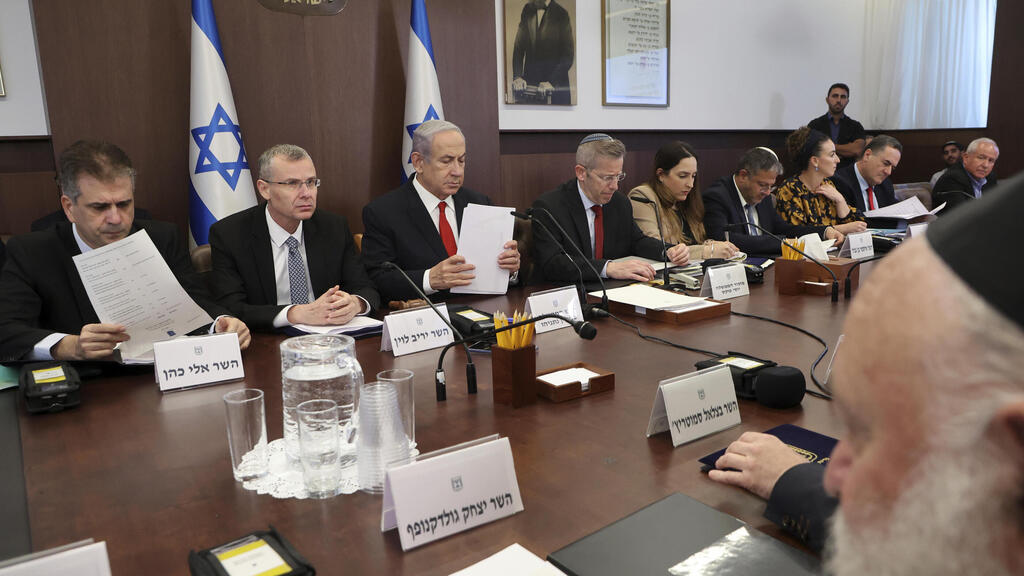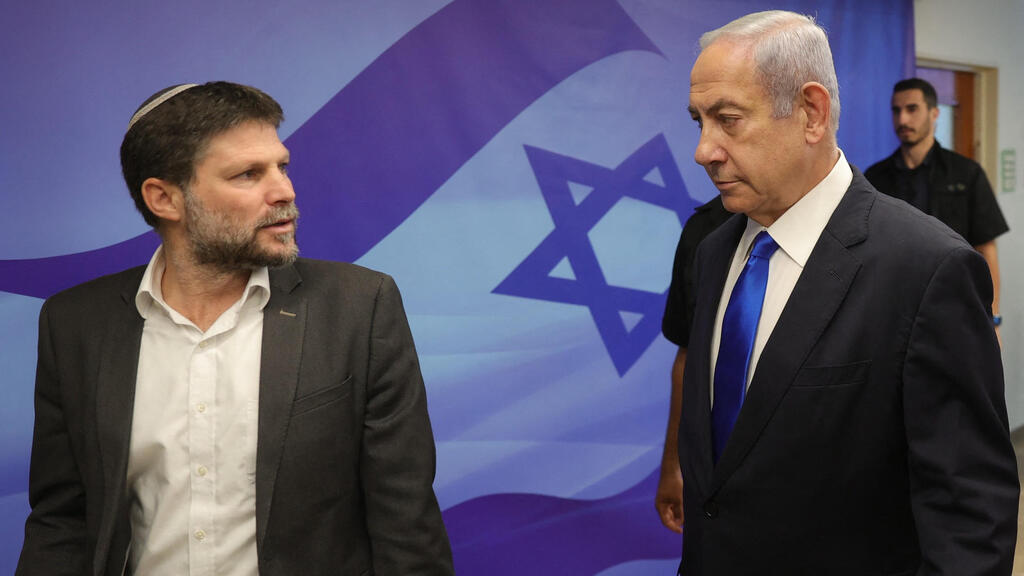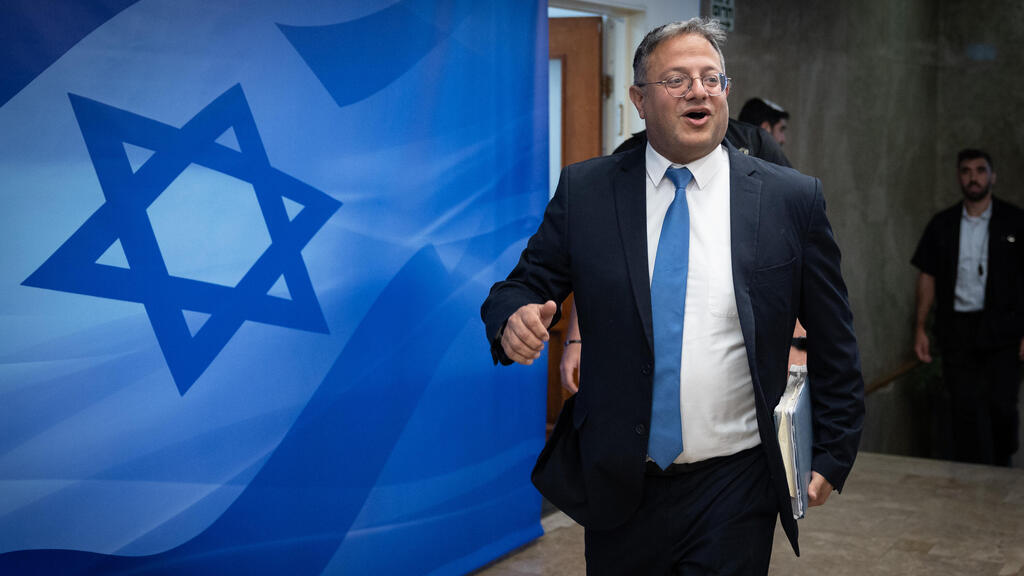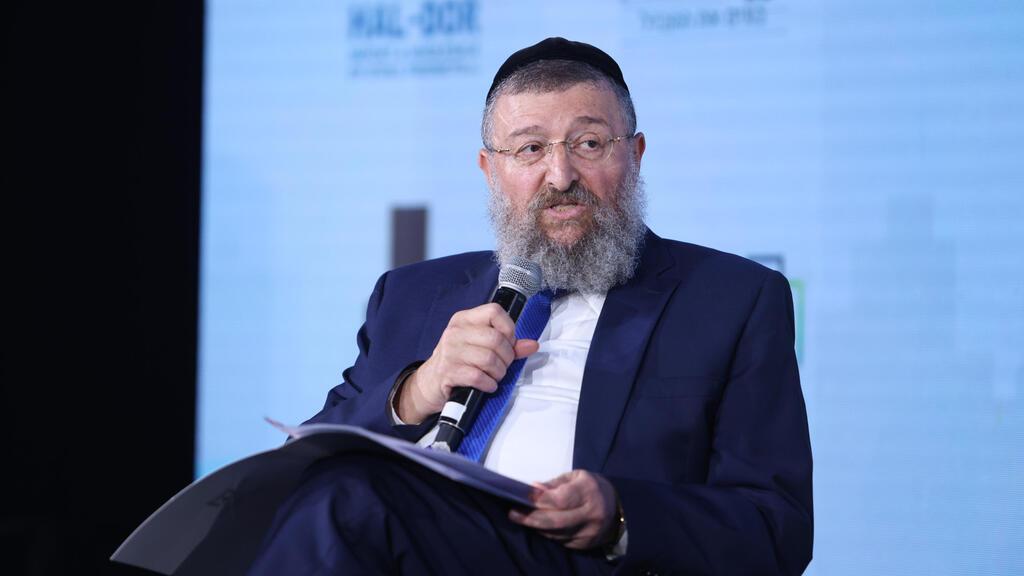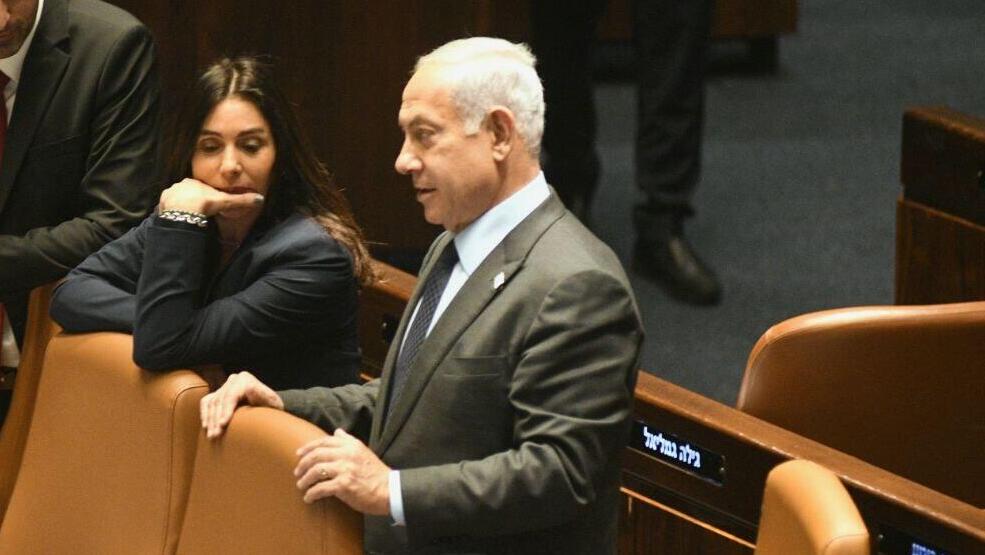Over seven months have passed since the beginning of the year, and on Sunday, the government unveiled its key objectives for 2023, including tackling the high cost of living, developing infrastructure and housing, enhancing government services with a focus on digitalization and streamlining bureaucracy, strengthening personal security, combating violence within the Arab community and reducing socio-economic disparities.
NETANYAHU PRESENTS GOVT ANNUAL WORK PLAN AT CABINET MEETING
(ILTV)
More stories:
Upon the establishment of the government, Prime Minister Benjamin Netanyahu and Finance Minister Bezalel Smotrich held a press conference where they announced the key points of the promising "Program for Addressing Economic Inflation," yet the measurable targets for reducing the cost of living are nowhere to be found in the government's objectives for 2023.
The Prime Minister's Office explained that specific targets in this regard will be reflected in the broader plans for 2024, and that currently, accelerated programs are being drawn up to address the cost of living.
The main annual program book, spanning 444 pages, is intended to make the main activities of the 49 government ministries and public organizations, as well as the key performance indicators in their major missions, transparent to the public.
The book includes the programs of 32 ministries, 15 support units and two statutory corporations. In accordance with the government planning guide, which generates a uniform methodology, the book outlines the definition of goals and objectives of the government bodies, key tasks and performance indicators, as well as policy emphases and planning for 2023. This year's book is published following the approval of the state budget, highlighting the ministers' and government's priorities.
The book provides detailed measurements for evaluating the success of each program, including productivity indicators (quantitative) that measure the outcomes of governmental activities, as well as outcome indicators that define the expected changes resulting from the ministries' operations.
Prime Minister Benjamin Netanyahu stated, "I call upon all partners and ministers in the government to work in a coordinated fashion to enhance the effectiveness of government activities. The work plans allow us to better manage the various processes, aim for significant results, and monitor their implementation. We will continue to monitor the progress and achievement of our goals."
Yossi Shelley, director-general of the Prime Minister's Office, said, "From economic promotion, through infrastructure development, to improving public services for citizens, we all work continuously, systematically and with quality, as reflected in the book, for the benefit of improving our quality of life."
Key points:
Finance Ministry:
- Cost of living: Emphasis on price reduction (food, consumer goods and electrical products), alongside efforts from within the Ministerial Committee on the Fight against the Cost of Living.
Energy Ministry:
- Increase in the production capacity of renewable energy.
- Emphasis on energy efficiency improvement.
- Expansion of public electric vehicle charging stations.
- Increase in natural gas production.
Defense Ministry (non-classified):
- Progress in establishing the Technological ICT Campus: In 2022, 39% of the project was completed, in 2023, 62% is expected to be completed, and by 2025, 95% will be completed.
National Security Ministry:
- The ministry is working toward the establishment of a National Guard, in accordance with the public committee led by the ministry's director-general.
- The ministry is working to increase the recruitment threshold in the security forces (police, IDF and Border Police). In 2022, there were 3,106 new recruits, which is expected to increase to 3,825 in 2023 and 4,125 in 2024.
- Crime and violence in the Arab sector - an increase in the clearance rate of criminal cases from 22% in 2022 to 36% during 2023.
- Firearm permit requests - an increase from 18,000 approved requests in 2022 to 40,000 in 2023.
Construction and Housing Ministry:
- Increase in approved housing units in the framework of urban renewal programs from 39,903 in 2022 to 42,000 in 2023.
- Increase in public housing apartment acquisitions to 235 in 2023 and 700 in 2024.
- Increase in housing lottery allocations from 20,609 in 2022 to 24,725 in 2023.
Health Ministry:
- Doctors per 1,000 population: Increase from 3.13 in 2022 to 3.14 in 2023, with an expected target of 3.16 in 2025.
- Increase in the number of medical students per year from 944 in 2022 to 1,100 in 2023, with a target of reaching 1,200 in 2024.
- The ministry is promoting the "Ozer LeRofe" (Doctor's Helper) law proposal to ease the workload, expected to be approved by the Knesset during the 2023 work year.
- Nurses per 1,000 population: Increase from 6.72 in 2022 to 6.75 in 2023, with an expected target of 6.8 in 2025.
- Reduction of waiting times for diagnosis and treatment in child development services, from the current average of over three months: 35% in 2022 to 34% in 2023, with an expected decrease to 31% in 2025.
- The ministry continues to work with a long-term program to reduce the obesity rate among adolescents. Currently, the measure stands at 31.4%, with a planned decrease to around 26% in 2028.
Environmental Protection Ministry:
- Increase in the volume of waste processed in an advanced sorting facility, from two million tons in 2022 to 2.5 million tons in 2023, with an expected target of 3.5 million tons by 2025.
- Long-term targets for reducing greenhouse gas emissions from 78 in 2021 (based on data from two years ago) to 58 by 2030.
- Significant increase in the rate of zero-emission vehicle sales as a percentage of total new vehicle sales: From 10% in 2022 to 15% in 2023.
Innovation, Science and Technology Ministry:
- Employment in the tech professions in Israel: From 508,300 positions in 2022 to 510,000 in 2023, and around 530,000 by 2025.
Foreign Ministry:
- Increase in trade volume between Israel and the United Arab Emirates from $2.5 billion in 2022 to $3 billion in 2023.
- Increase in digitalized consular services from two in 2022 to five in 2023. Planned to reach nine by 2025.
Economy and Industry Ministry:
- Significant emphasis on reducing the cost of living, with the benchmark being the price gap between Israel and the OECD average.
- Increase in labor productivity, as measured by the gap between Israel and the OECD average (output per hour worked).
National Digital Agency (a unit under the Economy Ministry):
- Streamlining of digital services: In the business sector, increase from 14 services in 2022 to 18 in 2023, and to 31 by 2025. For private individuals, to increase from 86 in 2022 to 90 in 2023, aiming for 120 by 2025.
Justice Ministry:
- Reduction in the processing time of real estate transactions from six days in 2022 to an expected five days in 2023.
- Crime and violence in the Arab sector - an increase in the clearance rate of criminal cases from 22% in 2022 to 36% during 2023.
Labor Ministry:
- Increase in employment rates among the non-ultra-Orthodox Jewish population aged 25-66 from 85.1% in 2022 to 86% in 2023.
- Increase in employment rates among Arab women aged 25-66 from 41.9% in 2022 to 53% in 2023.
Ministry for the Development of the Negev and Galilee:
- Increase in the number of scholarships granted to students in higher education institutions in the Negev and Galilee from 1,744 in 2022 to 2,500 in 2023, with a target of approximately 3,000 scholarships by 2025.
- Promotion of online stores to strengthen the economy in peripheral areas. In 2022, around 70 stores were opened, with a target of reaching 600 in 2023 and 1,000 in 2025.
Population and Immigration Authority:
- Passports: reduction in waiting times for passport issuance from 79 days in 2022 to 45 days in 2025.
- Initial steps to increase satisfaction with the quality of home care services.
Welfare and Social Affairs Ministry:
- Decrease in the percentage of elderly citizens experiencing loneliness from 27% in 2022 to 25% in 2023, with a target of 21% in 2025.
Transportation and Road Safety Ministry:
- Increase in the number of trips using public transportation from 778 million in 2022 to 900 million in 2023.
- Increase in the service reliability of bus transportation from 64% in 2022 to 69% in 2023.
Tourism Ministry:
- Increase in tourism revenue (domestic and incoming) from NIS 47.2 billion in 2022 to NIS 56.6 billion in 2023, with a target of approximately NIS 63.2 billion by 2025.
- Increase in the number of direct employees in the tourism sector from 127,000 in 2022 to approximately 155,000 in 2023.
Communications Ministry:
- Improvement in the ranking of cellular internet browsing speed from 70th place in 2022 to 67th place in 2023, with a target of reaching 35th place by 2025.
- Increase in the percentage of households in Israel with access to ultra-wideband infrastructure out of the total number of households. In 2022, this stood at 70%, with a planned 85% in 2023, and an expected target of approximately 95% by 2024.





